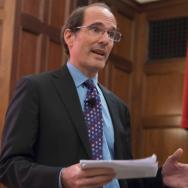With an estimated 500 million followers worldwide, Buddhism has had a far-reaching impact on constitutional design and reform in many countries. Yet, the relationship between the religion and this area of law has been the subject of comparatively little academic scholarship.
To help change that, a new interdisciplinary course at the University of Chicago Law School brought scholars from around the world together in a virtual format to study Buddhism’s relationship to constitutional practice.
The course, “Buddhism and Comparative Constitutional Law,” combined a winter seminar for students with a workshop series that allowed leading scholars of anthropology, political science, religion and law to present their ongoing work to a global audience.
Two dozen students from the Law School, the Divinity School and the Division of the Social Sciences participated in the seminar. For the workshop component, they joined scholars, government workers and graduate students from Sri Lanka, Myanmar, Thailand, Brazil, India, Australia, Japan and more than a dozen other countries.

“On so many dimensions, this course collapsed space,” said Prof. Tom Ginsburg, who co-taught the course with Lect. Benjamin Schonthal. “And it brought audiences together that otherwise would not be in conversation. All of those things have been really exciting.”
A new path for scholarship
In recent years, constitutional reform efforts in majority-Buddhist Asian nations have sparked new questions about the religion’s interplay with law while also highlighting a striking gap in the academic literature.
Although scholarship exists on Islamic, Christian and secular constitutional thought, the body of work on Buddhist constitutionalism is surprisingly thin—despite the religion’s extraordinary influence, especially in Southeast Asia.
That deficit could be a product of misguided narratives about the religion or the fact that it lacks an equivalent to Islamic shariah, Christian canon law, or Jewish halakha; it could also be that scholarly interests are only now shifting in this direction.
“Of the many subfields within the study of Buddhism and law that have not received adequate attention, the subfield of Buddhism and constitutional law stands out as acutely overlooked—a hole within a hole,” Schonthal wrote in the Asian Journal of Comparative Law in 2018.
That is changing, however, in part because of the growth of the field of comparative constitutional law, with legal scholars like Ginsburg pursuing new, interdisciplinary directions while religion scholars like Schonthal have also embraced questions about law and politics.
“On so many dimensions, this course collapsed space. ... It brought audiences together that otherwise would not be in conversation.”
Ginsburg, the Leo Spitz Professor of International Law, is a leading expert on comparative constitutionalism whose interest in Buddhism stretches back decades. Also a professor of political science, he now co-directs the Comparative Constitutions Project, and has worked on legal and constitutional reform in numerous countries.
Schonthal, a professor of Buddhist studies and co-director of the Otago Centre for Law and Society at the University of Otago in New Zealand, focuses on the intersection of religion, law and politics in South and Southeast Asia. He is the author of Buddhism, Politics and the Limits of Law: The Pyrrhic Constitutionalism of Sri Lanka.
A timely topic
The two met when Schonthal, AM’04, PhD’12, was studying at UChicago’s Divinity School, and their shared interest in Buddhist constitutionalism grew from conversation to collaboration. The topic has never been more relevant: In recent decades, nearly all Buddhist-majority countries in South and Southeast Asia have pursued constitutional reform, and Buddhist voices and ideas have been prominently involved.

“Nearly one-fifth of the world’s population live in countries where Buddhism has played a major role in shaping culture, politics and—yes—law,” Schonthal said. “Scholars have long written about the important role that Christian ideas and actors played in the development of American constitutional law, and Buddhist actors and ideas did the same thing in many parts of Asia.”
“Of course, the influence doesn’t run only one way,” he added, “Changes to public law in Asia have also profoundly affected modern Buddhism. All of this means that if we want to understand some of the big issues facing the region—questions of democracy, nationalism, legal and religious reform—legal studies and Buddhist studies need each other.”
The scholars were intrigued by a variety of questions: How do the roles of Buddhist monks affect constitutional changes? How do constitutional reform projects affect the practice of Buddhism? Do existing models in the study of religion and constitutional law adequately explain the dynamics of Buddhism and constitutional law in Asia?
Ginsburg and Schonthal began looking for opportunities to bring experts from across the world into conversation. In 2016, they co-edited a special issue of the Asian Journal of Law and Society on Buddhism. And in 2020, they planned to hold a conference on Buddhism and constitutional law—one that would bring together scholars from around the world who were charting new paths into the subfield.
Then, of course, COVID-19 hit.
The two scholars opted to instead launch a virtual workshop series, which later developed into a course. The seminar drew students with a range of interests and perspectives: Some of the Law School students knew little about Buddhism but were interested in constitutionalism, while one of the Divinity School students was a Buddhist nun.
“One thing that was really great about the class is that it wasn’t just law students—there were all these different voices,” said Rachel Lebowitz, a third-year law student who was drawn to the class by an interest in constitutional interpretation and international law. “It was just a really rich discussion.”
“It wasn’t just law students—there were all these different voices.”
The workshop component allowed students to have a front-row seat as scholars hammered out the parameters of an evolving subfield.
“One of the nice things about Zoom is that you can bring people from all over the world together,” said Susan Li, a third-year law student who chose the class in part because she appreciated its non-Western perspective and unusual structure.
Exploring the impact of Buddhism on constitutional law
Buddhists have played an increasingly vocal role in constitutional law and politics, Ginsburg said—and with a range of effects, good and bad. In Myanmar, for example, some Buddhist monks came out against the recent military coup; earlier, some nationalist monks participated in stirring up violence against the Muslim minority Rohingya.
In general, the Buddhist monastic community (or sangha) has played an important role in society in many South and Southeast Asian countries. Their voices often carry a lot of weight even though, in some countries, they are forbidden from voting, Ginsburg said.
“In order to understand [this part of] the world, you have to understand what the Buddhists are thinking,” Ginsburg said. “And I think, by the way, that some of the students might have been surprised to learn that Buddhists are not always about peace and love—they can be political actors and even regressive ones.”
The role that the sangha play in majority-Buddhist countries like Myanmar (also called Burma), Thailand and Sri Lanka runs contrary to how many westerners think about secular constitutionalism.
“Concepts that we like to think about in constitutional law—separation of church and state for example—really don’t make sense in a lot of cultures,” Ginsburg said. “So one of the things we’re trying to do … is ‘decolonize’ comparative constitution law by inductively understanding the experiences of Southeast Asian peoples from their own perspective.”
“It’s a good reminder that there are a lot of topics that haven’t yet been mined.”
For Li, the class highlighted how intellectually stirring a new topic—and a less conventional class—can be. During a discussion on secularism, the topic veered toward the concept of the ministerial exception to employment discrimination laws, which had been the subject of her 1L brief. Li hadn’t expected to connect a topic from her first year to a niche seminar in her third year. It was interesting and felt “full circle,” she said.
But even more, it hammered home just how much there is to study and learn.
“Buddhism is one of the biggest religions in the world, and yet in all the [study] about religion and law, this area hadn’t been [well-explored],” she said. “It’s a good reminder that there are a lot of topics that haven’t yet been mined.”
—Adapted from a story first published by the Law School.








